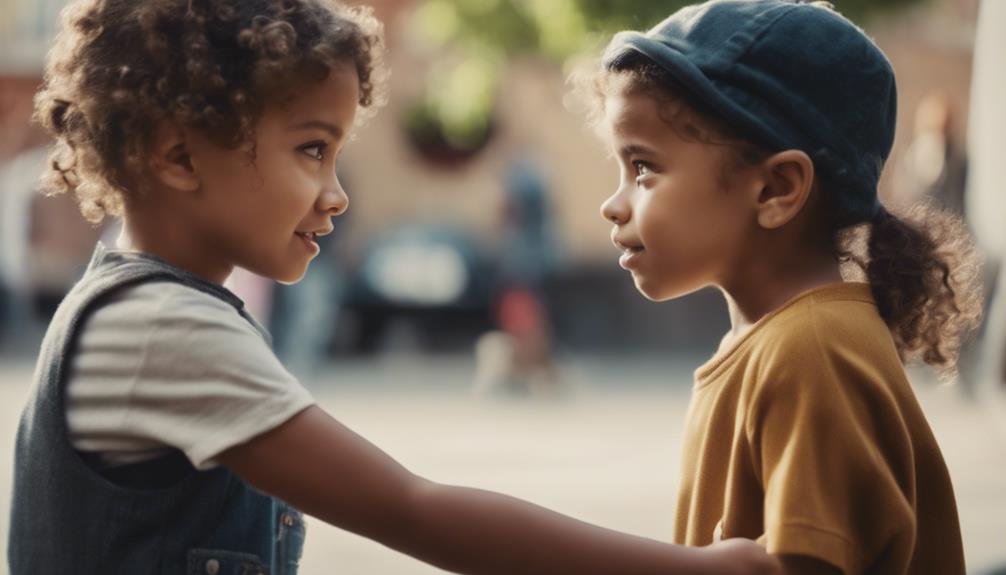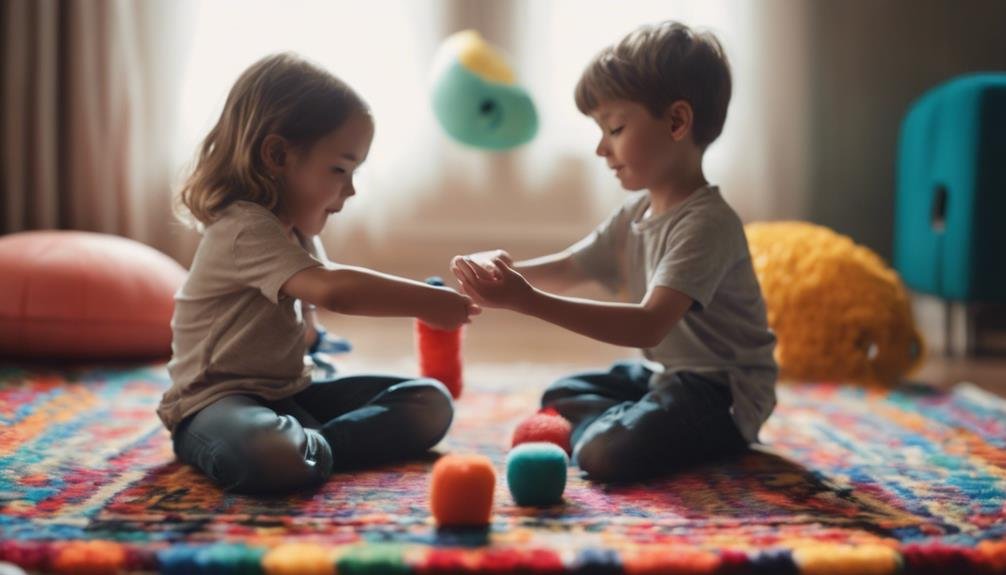"Cherishing Little Steps - A Haven for Baby and Family Journeys"
Social Skills Development in Early Childhood: Activities and Tips
Did you know that studies have shown that children who develop strong social skills early on are more likely to succeed academically and have positive relationships later in life?
Understanding how to nurture these skills in your child is vital. From fostering empathy to encouraging effective communication, there are various activities and tips that can help your little one blossom socially.
By incorporating these strategies into your daily routines, you can lay a solid foundation for your child's future interactions.
Key Takeaways
- Peer interactions and group activities are vital for early social skills development.
- Playdate preparation involves teaching manners, planning activities, and considering snacks.
- Empathy building activities include storytelling, role-playing, volunteering, and expressing gratitude.
- Cooperative games aid in teamwork, communication, trust-building, and problem-solving for social skills.
Importance of Social Skills

Understanding the significance of social skills in early childhood is important for fostering healthy development and positive relationships. Peer interactions are a critical aspect of a child's social development. Encouraging your child to engage with peers helps them learn valuable skills like communication, cooperation, and empathy. These early interactions lay the foundation for building lasting relationships in the future.
Social engagement plays an essential role in shaping a child's social skills. By engaging in various social activities, children learn to navigate different social situations and understand the importance of teamwork and sharing. Encouraging your child to participate in group activities or join clubs can greatly enhance their social skills development.
Playdate Preparation
Preparing for playdates with other children is an opportunity to help your child develop important social skills in a fun and interactive setting. To make the most out of these social interactions, consider the following tips:
- Scheduling Logistics: Make sure you establish a convenient time and location for the playdate. Check with the other child's caregiver to coordinate a time that works for both parties.
- Playdate Etiquette: Teach your child basic manners like sharing, taking turns, and being respectful towards others. Encourage them to greet their playmate and thank them for hosting.
- Prepare Activities: Have a few simple games or toys ready to facilitate play and keep the children engaged. Consider activities that promote cooperation and communication.
- Snack Time: Offer a small snack during the playdate to encourage sharing and create a relaxed atmosphere. Be mindful of any allergies the other child may have.
Empathy Building Activities

To enhance your child's ability to understand and connect with others' feelings, engaging in empathy-building activities can be a valuable and enriching experience. By participating in empathy workshops and compassion activities, your child can develop a deeper sense of empathy and connection with those around them. These activities are designed to help children recognize and understand emotions in themselves and others, fostering a more compassionate and caring attitude.
Here is a table outlining some empathy-building activities you can try with your child:
| Activity | Description |
|---|---|
| Storytelling | Encourage your child to express emotions by telling stories or acting out scenarios. |
| Role-Playing | Act out different situations to help your child understand varying perspectives. |
| Volunteer Together | Engaging in community service activities can teach your child the value of helping others. |
| Feelings Chart | Create a chart to help your child identify and express their own and others' emotions. |
| Thank You Notes | Encourage your child to write thank you notes to practice gratitude and kindness. |
Cooperative Games
Curious about how cooperative games can benefit your child's social skills development? Engaging in cooperative games not only fosters fun and excitement but also provides valuable opportunities for your child to enhance their social skills. Here's how these games can help your child grow:
- Teamwork Challenges: By working together towards a common goal, such as completing a puzzle or winning a relay race, your child learns the importance of cooperation and collaboration.
- Communication Exercises: Cooperative games often require effective communication to strategize and succeed. Your child can practice listening to others, expressing their ideas clearly, and understanding different perspectives.
- Building Trust: Through shared experiences in games that involve trust-building activities, your child learns to rely on others and develop trust in their peers.
- Problem-Solving Skills: Facing challenges in cooperative games encourages critical thinking and problem-solving abilities, teaching your child how to overcome obstacles by working with others.
Encouraging your child to participate in these teamwork challenges and communication exercises can significantly contribute to their social skills development in a fun and interactive way.
Communication Techniques

When engaging in communication techniques with your child, focus on fostering active listening and clear expression to enhance their social skills development effectively. Active listening involves giving your full attention to your child when they're speaking, making eye contact, and nodding to show you're engaged.
Encourage them to express themselves clearly by asking open-ended questions and confirming what they say to make sure understanding. Pay attention to body language as well; teach your child to interpret nonverbal cues like facial expressions and gestures to better understand others' emotions.
Emotional Regulation Strategies
Implementing effective emotional regulation strategies is crucial for fostering your child's social and emotional development. Teaching your child how to manage their emotions not only helps them navigate social interactions but also sets a strong foundation for their future well-being. Here are some strategies to support your child in developing healthy emotional regulation skills:
- Practice Mindfulness Exercises: Encourage your child to engage in simple mindfulness activities like deep breathing or focusing on their senses to help them stay present and calm.
- Teach Calming Techniques: Show your child how to use calming techniques such as counting to ten, taking a break, or using a stress ball to release tension.
- Create a Safe Space: Help your child identify a safe space where they can go to calm down when feeling overwhelmed or upset.
- Model Healthy Emotional Regulation: Be a positive role model by demonstrating healthy ways to manage your own emotions, showing your child how to navigate challenging feelings effectively.
Conflict Resolution Tips

To further support your child's emotional development and social interactions, understanding effective conflict resolution tips is essential for nurturing their ability to navigate and resolve disagreements positively and constructively. Conflict resolution involves teaching negotiation skills and problem-solving techniques that can benefit your child's social interactions and emotional well-being. Here are some practical tips to help your child develop these essential skills:
| Conflict Resolution Tips | Description |
|---|---|
| Active Listening | Encourage your child to listen attentively to others' perspectives without interrupting. |
| Empathy | Teach your child to understand and share the feelings of others involved in the conflict. |
| Finding Common Ground | Help your child identify shared interests or goals to find mutually agreeable solutions. |
| Brainstorming Solutions | Encourage creative thinking to come up with multiple solutions to the conflict. |
Teaching Sharing and Turn-Taking
Encouraging your child to practice sharing and turn-taking from an early age fosters essential social skills that are fundamental for cooperative interactions and building positive relationships with peers. Here are some tips to help you in teaching these important skills:
- Sharing Games: Engage your child in activities that involve sharing, such as playing with toys that require taking turns or sharing snacks during playdates. This helps them understand the concept of sharing in a fun and interactive way.
- Turn-Taking Activities: Encourage your child to participate in games or tasks that involve taking turns, like board games or group activities where each child gets a chance to speak or lead. This teaches patience and the importance of waiting for their turn.
- Modeling Behavior: Be a role model by demonstrating sharing and turn-taking in your interactions with your child and others. Children learn best by observing and imitating adult behavior.
- Positive Reinforcement: Praise and acknowledge your child's efforts when they share or take turns successfully. Positive reinforcement encourages them to continue practicing these social skills.
Building Confidence and Self-Esteem

How can you help your child develop a strong sense of confidence and self-worth early on in life? Building resilience and fostering independence are key components in nurturing your child's confidence and self-esteem. Encouraging them to try new things, even if they might fail, teaches them that setbacks are a natural part of learning and growth. Praise their efforts and progress rather than just focusing on the end result to instill a belief in their abilities.
Allowing your child to make choices and solve problems independently helps them develop a sense of competence and self-assurance. Offer support and guidance when needed, but also give them space to explore and learn from their experiences. Celebrate their accomplishments, no matter how small, to boost their self-esteem and reinforce positive behavior.
Encouraging Kindness and Respect
Help your child understand the importance of kindness and respect by modeling these behaviors in your daily interactions. Teaching empathy and respect is essential in shaping your child's social skills.
Here are some activities and tips to encourage kindness and respect:
- Empathy exercises: Engage in activities that promote understanding and sharing feelings. For example, ask your child how they think a friend feels in certain situations.
- Respect activities: Encourage your child to show respect towards others' opinions and differences. Teach them to listen actively without interrupting.
- Kindness games: Play games that involve acts of kindness, such as sharing toys or helping a family member with a task.
- Communication techniques: Teach your child effective communication skills like using polite words, active listening, and expressing appreciation.
Role-Playing Scenarios

Engage your child in role-playing scenarios to enhance their social skills and emotional intelligence. Through improvisation exercises and character role play, children can learn to navigate social interactions effectively. Encouraging your child to take on different roles and respond to various scenarios can help them understand different perspectives and improve their empathy towards others.
Role-playing also provides a safe space for children to practice peer interaction and learn about social cues. By pretending to be in different social situations, they can explore appropriate responses and behaviors, preparing them for real-life interactions. This hands-on approach allows children to experiment with different communication styles and problem-solving techniques in a supportive environment.
Remember to keep the role-playing sessions light-hearted and fun, emphasizing the learning opportunity rather than focusing on significance. Encourage creativity and imagination, and praise their efforts in trying new approaches. By engaging in role-playing scenarios, your child can develop significant social skills that will benefit them throughout their lives.
Social Skill Development Milestones
To track your child's progress in social skill development, it's important to understand the key milestones they should be reaching at different stages of their early years.
- Peer Interactions: By age 2, your child should start showing interest in playing with other children and engaging in simple social interactions like sharing toys.
- Social Cues: Around age 3, they should begin to recognize basic social cues such as understanding when someone is happy or sad based on facial expressions.
- Friendship Skills: As they approach age 4, children typically start forming closer friendships and showing preferences for certain playmates.
- Emotional Awareness: By age 5, most kids can better express their emotions and understand the feelings of others, leading to more complex social dynamics in their interactions.
Understanding these milestones can help you support and encourage your child's social development, setting a strong foundation for healthy relationships and positive social interactions in the future.
Frequently Asked Questions
How Can Parents Involve Their Child's Teachers or Caregivers in Social Skills Development?
To involve your child's teachers or caregivers in social skills development, prioritize parent-teacher communication. Collaborate on strategies like role-playing and using social stories. Together, you can create a supportive environment that nurtures your child's social growth.
Are There Any Specific Resources or Tools Available to Help Track a Child's Progress in Social Skills Development?
When it comes to tracking your child's progress in social skills, there are tools available to make it easier. Resources can help you see how they're building skills over time, providing valuable insights and guidance.
What Are Some Common Challenges Parents May Face When Trying to Teach Social Skills to Their Child?
When teaching social skills, you may encounter challenges like role-playing reluctance or difficulty with peer interaction. Providing social modeling and encouraging communication can assist. Remember, it's normal for parents to face obstacles, but persistence and patience are key.
How Can Parents Address Social Skills Development in Situations Where Their Child May Have Special Needs or Disabilities?
When supporting a child with special needs in social skills development, it is crucial to tailor individualized strategies. Seek support groups for guidance and comfort. Engage in sensory-friendly activities and utilize communication tools to enhance interactions.
Are There Any Recommended Techniques for Helping a Shy or Introverted Child Build Social Skills in Group Settings?
To help your shy or introverted child in group settings, try role playing activities to boost social confidence. Encourage peer interaction through group play strategies. These techniques can foster social skills development and help your child feel more comfortable.
Conclusion
As you wrap up your day of social skills development activities with your child, you may notice the sun setting in the distance. Just like the sun sets and rises each day, your child's social skills are growing and evolving.
By engaging in these activities and tips, you're laying the foundation for a bright future filled with meaningful connections and positive interactions. Keep nurturing your child's social skills, and watch them shine like the sun in the sky.


